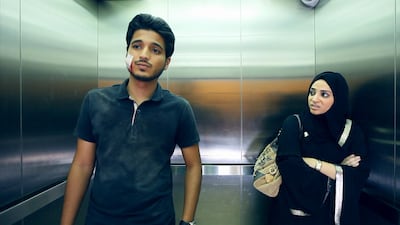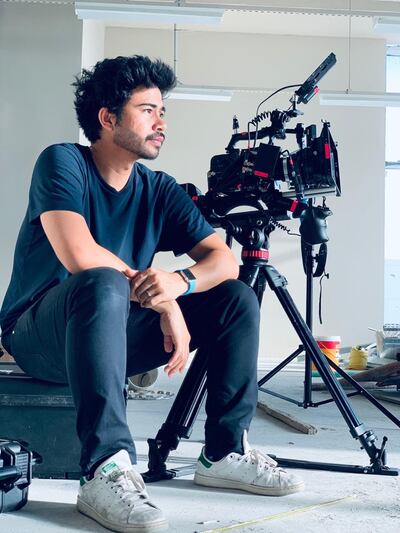The Saudi Arabian entertainment scene has evolved so rapidly that a local drama on life in the kingdom made just nine years ago now feels like a historical document.
That is what makes Takki so intriguing.
The series was an online sensation throughout its four-year run on YouTube (which ended in 2015) thanks to its unique portrayal of Saudi youth culture years before the arrival of international music and arts festivals.
And a larger international audience will now get a glimpse of Saudi Arabia on the cusp of a cultural revolution because Takki is streaming on Netflix.
Takki is Saudi slang for "relax", and the Jeddah-set series revolves around two local creatives struggling to find their place in society.
Malek, played by Moayad Al Thagafi, is an aspiring filmmaker trying to make it in a kingdom which, at that time, had a ban on cinemas. Meanwhile, Bayan, played by Khairiah Abu Laban, is determined to make it in the media despite the roadblocks in her way.
The fast-moving episodes of up to 25 minutes are filled with peppy dialogue, but Takki didn't initially stand a chance of being screened by any of the kingdom's main broadcasters, says Saudi writer and director Mohammad Makki.
The Saudi drama landscape has traditionally been dominated by stories about wealthy families and their melodramatic struggles, so Makki says Takki's youth-focused plot was uninteresting territory for television executives.
“At that time there were really no shows talking about normal Saudi youth, particularly in Jeddah."
He says it was rare to find stories that "discussed jealousy, love, friendship and relationships in a very relatable way".
"Instead, there were shows focusing on elite Saudi families and their dramas. Now, while there are families like that, it's not representative of the whole country of course," he tells The National.
Telling authentic Saudi Arabian stories
Makki found a kindred creative spirit in Kaswara Al Khatib, the founder of online production house Uturn Entertainment. The company found success with a string of youth-centred YouTube talk shows, such as Eysh Elly and Noon Al Alniswa.
Al Khatib was looking for a dramatic story to share. "We really want more people to know more about Saudi Arabia and to do that, we have to find people with genuine content that people actually want to see," he says. "In that way we are not really a production house, but storytellers.
"We view ourselves as a talent incubator that finds people who will share authentic stories about Saudi Arabia. Takki is a great example of that."
Under the tutelage of Al Khatib, work on the series began in 2011, with directorial workshops for Makki as well as copious study notes for series star Al Thagafi.
The actor says Al Khatib "was like a teacher" and would give "the actors books to read”. “One of the main things that he was telling the actors was to keep our performances real. A lot of time with Gulf dramas, the acting is intentionally over the top. Kaswara kept telling us to tone it down and keep it as authentic as possible.”
The advice was the same to Al Makki when penning scripts. While the show’s overarching plot follows Malek and Bayan’s quest to achieve their dream professions, each episode features a subplot touching on hot-button social and cultural issues, including cyber bullying, the role of religious police, criminal gangs and societal expectations of both men and woman.
“Every episode got a backlash online, particularly since we were working with a female actor because, at that time, the audience was not used to seeing a female acting online,” Al Makki recalls.
“Then we had an episode where a member of the religious police was a friend of the main character and we nearly got in a lot of trouble for that. But we managed to portray that character in a reasonable and balanced way.”
As the series lead, Al Thagafi recalls his anxiety surrounding the material on the eve of the debut episode dropping in 2011. “I swear to you that I couldn’t sleep,” he says. “In my mind, I was preparing for the online attacks to come from whatever angle. But I would say 80 per cent of the comments that we received have been very positive.”
The future is bright for Saudi creatives
And with Takki's recent acquisition by Netflix, that reception is now international, with millions of global subscribers now served up this vibrant slice of Saudi life.
However, with the kingdom undergoing such seminal changes since Takki's last episode in 2015, such as women driving and the opening of cinemas, is the material too outdated?
"I don't think so," Makki states. "Because we are talking about relationships and emotions that any human being from any part of the world can feel and understand. So no matter what year you watch it, Takki still feels relatable because it is talking about things that are universal."
Will there be a second season?
While there is no announcement yet on whether the show will be rebooted for a new season on Netflix, Al Khatib is confident that more timely and youthful Saudi dramas will appear on our screens in the years to come.
Only this time, he notes, they won't be the outliers, but part of the mainstream.
“Things are happening here in Saudi,” he says.“There is a huge film and television infrastructure in place. There is a huge media city getting built in Riyadh and we have a film commission to support short films as well as feature films.
"This gives us all a lot of confidence. It feels great for many of us who got started before any of this support was around, because now we feel like we are at the forefront of this change."




